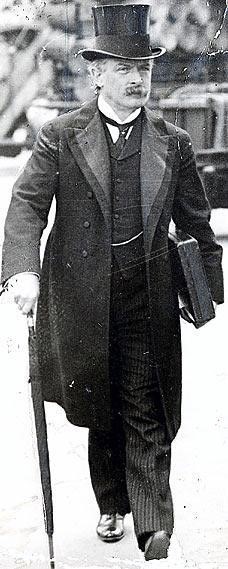All those Liberal ministers – the Lloyd George connection
Since the general election and the formation of the first peacetime coalition government in Britain since the National Government in 1931, there has been a lot of looking back. Much of the history keeps coming back to Lloyd George.
It was the Wall Street crash of 1929 which precipitated the global financial crisis of the Great Depression. Britain was severely affected, especially by rising unemployment and fears of a run on the pound. The Labour prime minister, Ramsay MacDonald, proposed changes in taxation and expenditure in order to balance the budget and restore confidence but his cabinet would not agree and he had to resign. Rather than fight an election on the issue, MacDonald and the few Labour ministers who supported him got agreement from the King to form a National Government to include members of the other parties, including the Liberals, with the object of balancing the Budget and restoring confidence. The government would then dissolve itself and a general election would be held on party lines. But the crisis continued and the Labour Party expelled MacDonald and his colleagues. When the general election came MacDonald formed National Labour and the other parties agreed to allow their local organisations to agree whether or not to oppose each other.
Lloyd George had been unwell during the negotiations for the formation of the National Government. His place had been taken by Herbert Samuel. Samuel was instinctively opposed to the idea of a government committed to imposing tariffs as a betrayal of the traditional Liberal policy of Free Trade but the party was divided and wished to support the prime minister in his attempts to tackle the economic crisis.
When the general election came, the only Liberals to oppose the National Government were Lloyd George and what became known as his family group; his son Gwilym (MP for Pembroke), his daughter Megan (MP for Anglesey) and Goronwy Owen who represented Caernarfonshire. Two other candidates associated themselves with the LG at the 1931 general election; Frank Owen who had been MP for Hereford since 1929 and who later published a biography of LG (Tempestuous Journey, 1954) and the famous novelist Edgar Wallace who stood and lost in Blackpool.
Before the National Government, the previous time there had been Liberals in government was during the Lloyd George-Bonar Law coalition of 1916-1922. Many Liberal Democrat ministers in the present government are looking back to those days of the premiership of the Welsh Wizard to trace their antecedents.
For instance, it is the first time since 1922, when Robert Munro, the Coalition Liberal for Roxburgh and Selkirk, was appointed Secretary of State for Scotland by Lloyd George, that an MP representing Scottish Borders constituency has sat in the Cabinet. Before Vince Cable became Business Secretary, the last Liberals (as opposed to National Liberals) to serve as trade ministers were appointed by Lloyd George between 1916-1922. They were Sir Hamar Greenwood (then Liberal MP for Sunderland) who served as Secretary for Overseas Trade from 1919-20 and Frederick Kellaway (MP for Bedford) who took over from Greenwood and held the post until 1921.
There will be more examples too but you just know most of them will refer back to David Lloyd George.
